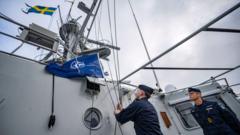Following a series of threats to undersea infrastructure, Swedish police have launched an investigation into the potential sabotage of a vital telecom cable situated in the Baltic Sea, linking Germany and Finland. This incident occurs in a context of escalating security worries following Russia's invasion of Ukraine in 2022, prompting NATO to initiate a defensive mission in the region last month.
Sweden Probes Possible Sabotage of Undersea Telecom Cable Amid Heightened Tensions

Sweden Probes Possible Sabotage of Undersea Telecom Cable Amid Heightened Tensions
Swedish authorities investigate undersea cable damage as NATO enhances Baltic Sea monitoring in response to security concerns.
Sweden's Prime Minister Ulf Kristersson confirmed awareness of the incident, highlighting its gravity within the current security landscape. The cable, owned by Finnish operator Cinia, has reportedly experienced minor damage, yet it continues to function normally. Cinia noted this is the third instance of damage to the cable since November, when it was completely severed.
In recent months, there has been a disturbing pattern of damage to undersea infrastructure, with causes ranging from dragging anchors of civilian ships to suspected foreign interference. The Swedish coastguard has deployed a research vessel to the eastern part of Gotland, seeking crucial information about the incident. As investigations unfold, authorities remain vigilant about the potential for sabotage, particularly given the suspicions surrounding Russian involvement. Meanwhile, weather conditions and human error have also contributed to the ongoing risks faced by undersea cables and pipelines in the region.
In recent months, there has been a disturbing pattern of damage to undersea infrastructure, with causes ranging from dragging anchors of civilian ships to suspected foreign interference. The Swedish coastguard has deployed a research vessel to the eastern part of Gotland, seeking crucial information about the incident. As investigations unfold, authorities remain vigilant about the potential for sabotage, particularly given the suspicions surrounding Russian involvement. Meanwhile, weather conditions and human error have also contributed to the ongoing risks faced by undersea cables and pipelines in the region.




















